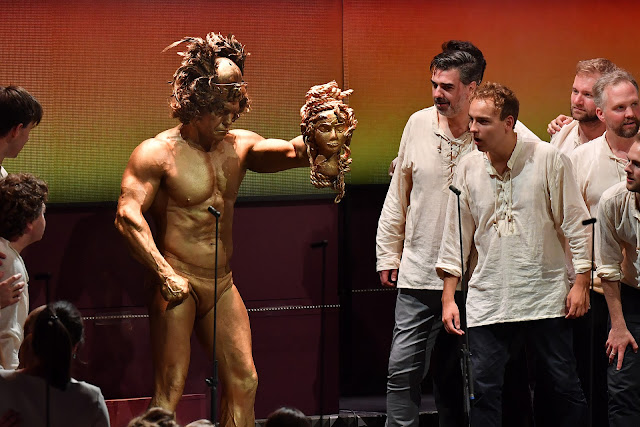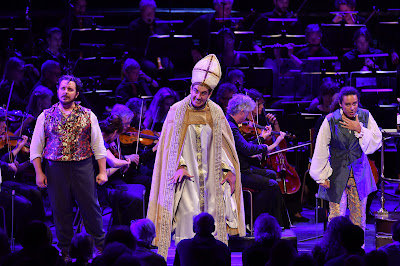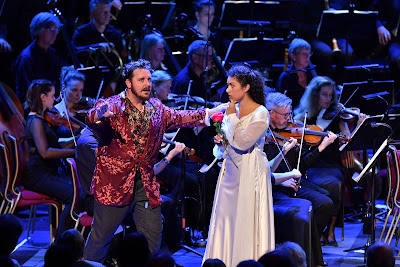 |
| Berlioz: Benvenuto Cellini - Duncan Meadows, Monteverdi Choir - BBC Proms (Photo BBC / Chris Christodoulou) |
Reviewed by Robert Hugill on 2 September 2019 Star rating: (★★★★★)
Berlioz' complex yet engaging opera erupts onto the Royal Albert Hall stage in a carnivalesque manner, but with a thrilling attention to detail
 |
| Berlioz: Benvenuto Cellini - Michael Spyres, Tareq Nazmi, Adèle Charvet - BBC Proms (Photo BBC / Chris Christodoulou) |
The way that Benvenuto Cellini continues in the repertoire, in some form, is perhaps an indication of the affection with which the piece is held, despite the difficulty of the music and the craziness of the dramaturgy, the work's sheer invention, imagination and energy carry you away.
Sir John Eliot Gardiner continued the tradition by bringing his concert staging of Berlioz' Benvenuto Cellini to the BBC Proms on Monday 2 September 2019. Michael Spyres sang Benvenuto Cellini, Sophia Burgos was Teresa, Maurizio Muraro was Balducci, Tareq Nazmi was Pope Clement VII, Vincent Delhoume was Francesco, Lionel Lhote was Fieramosca, Adèle Charvet was Ascanio, Ashley Riches was Bernardino, with the Monteverdi Choir and the Orchestre Révolutionnaire et Romantique. The concert staging was directed by Noa Naamat.
 |
| Berlioz: Benvenuto Cellini - Michael Spyres, Sophia Burgos BBC Proms (Photo BBC / Chris Christodoulou) |
In fact, there is one more version of the opera! Berlioz original plan was for an opera comique, but it was turned down so when approaching the Paris Opera with the idea the spoken dialogue had to be dropped. But the French vocal score was published with cues marking the dialogue, and a revival with dialogue, was planned at the Théâtre-Lyrique in l856 (though this did not happen).
At the BBC Proms, John Eliot Gardiner made his own selection (based on Hugh Macdonald's critical edition), so what we heard was 1838 with some elements of 1852. The result was long and full of felicitous detail omitted in the 1852 version, and had moments which were truly delightful but which, frankly, held up the action. But then, if one wanted tight, focused drama one would not listen to Benvenuto Cellini, its charms are those of the sprawling, riotous carnival which it depicts at the end of Act One. Hugh Macdonald's 1966 article on the Hector Berlioz website aptly sums up the differences between the various versions.
 |
| Berlioz: Benvenuto Cellini - Vincent Delhoume, Michael Spyres, Adele Charvet, Ashley Riches BBC Proms (Photo BB*C / Chris Christodoulou) |
The role calls for flexibility, strength, stamina (the 1838 version is a long sing) and an ease in the high register, combined with a sense of comedy! No wonder opera companies shy away from it. The first Benvenuto Cellini in the revised, 1852 Weimar version, was the first Lohengrin which perhaps indicates the direction some of the 1852 changes were going.
 |
| Berlioz: Benvenuto Cellini - Lionel Lhote, Sir John Eliot Gardiner BBC Proms (Photo BBC / Chris Christodoulou) |
There were some profoundly beautiful moments too, notably Cellini's Act Two solo when he sings of the simple life, but in some later high passages we were also aware of Spyres managing his voice, this was his third performance in the role in five days (the production had been seen at the Festival Berlioz, La Côte-St-André on 29 August, and the Berliner Festspiele, Berlin on 31 August, and travels to the Opéra Royal, Palace of Versailles next Sunday. That is quite a punishing schedule for such a taxing opera.
The beauty of Spyres performance was that he wasn't just a comedian, but also brought out Cellini as the serious artist as well, and he really made the most of the quite full version of the piece that we heard, making all the felicitous details count. We were really rooting for him, so that the final casting scene was edge of the seat stuff, in all the best ways.
 |
| Berlioz: Benvenuto Cellini - Sir John Eliot Gardiner BBC Proms (Photo BBC / Chris Christodoulou) |
Fieramosca, the Pope's official sculptor and Cellini's rival suitor for Teresa's hand, is technically a comic role, he is perpetually the butt of Cellini's manoeuvrings and always seems to come of worse. I have always loved the Act One trio, where Cellini instructs Teresa about the plans for tomorrow's carnival, and then when they repeat them, Berlioz adds a third line for Fierramosca who is now listening. It is very funny, and dazzling musically, and perhaps sums up Benvenuto Cellini. Lionel Lhote made Fierramosca a wonderfully funny character, a hapless schemer who always failed, but he brought rumpled charm to the role and had the right sort of presence to be threatening too, and he sang very finely indeed. This was no buffo bumbling, but Berlioz' high baritone line beautifully and dextrously sung.
The smaller roles are also highly important in this opera, and there is a strong ensemble element to the piece requiring a well-balanced cast. At the Royal Albert Hall we had a series of well drawn characters, but also a sense of ensemble too.
Adèle Charvet was a charming Ascanio, complete with a fine youthful swagger. Ascanio is not a huge role, but Charvet gave the young man strong personality, and she made the most of her delightful (yet dramatically redundant) Act Two aria. Maurizio Muraro was a finely comic, very buffo Balducci (Muraro was a last minute replacement for Matthew Rose). Tareq Nazmi was very funny indeed as the Pope, here a frankly comic character prone to falling asleep. Ashley Riches and Vincent Delhoume (repacing Krystian Adam) were Cellini's co-workers Bernardino and Francesco, always popping up and contributing much by their double act. Peter Davoren and Alex Ashworth (both from the Monteverdi Choir) provided finely comic cameos as the Innkeeper and Pompeo.
The staging by Noa Naamat was simple but effective, and she did not shy away from any of the librettos requirements, so we had a carnival scene, and we had the casting of Perseus (though embodying the statue on stage in the person of Duncan Meadows was perhaps unnecessary). Essential to this was the Monteverdi Choir which sang with focused dexterity and power, yet also entered with a will into the whole of the action, erupting on stage during the carnival.
The whole performance had a rhythmic tightness and brilliance which belied the music's complexity and Gardiner's speeds certainly took no prisoners so that the Carnival scene was completely dazzling in many ways as choir, soloists and orchestra articulated Berlioz' busy and complex rhythms whilst keeping the whole sparkling and fun. The finale, with the casting of Perseus, was equally devastating.
It was here and in other moments that we could really appreciate the period instruments. The narrow bore brass, including cornets as well as trumpets, and an ophecleide (!) made a strongly characterful impression without overbalancing in the way can happen with modern instruments and the period wind (with four bassoons) were similarly characterful and colourful. And it was this sense of a wider range of colour that we took away from the performance, something that Gardiner seemed to relish. The period strings were lighter in colour and far less dominant in the busy passages, making the whole full of lovely detail, which meant we could appreciate the sheer skill of all the performers.
This was a performance which positively sped by, the sprawling drama overflowed the whole Royal Albert Hall stage and erupted in a carnival of delightful moments, but Sir John Eliot Gardiner kept things flowing and moving, always aware of the need for pacing and the importance of making the details build into something greater. Whilst Michael Spyres charming rogue was at the centre, this was a finely balanced ensemble cast which made this most tricky yet engaging a complete delight.
This review also appears on OperaToday.com
 |
| Berlioz: Benvenuto Cellini - The casting of Perseus - BBC Proms (Photo BBC / Chris Christodoulou) |
Sophia Burgos - Teresa
Maurizio Muraro - Balducci
Tareq Nazmi - Pope Clement VII
Vincent Delhoume - Francesco
Lionel Lhote - Fieramosca
Adèle Charvet - Ascanio
Ashley Riches - Bernardino
Duncan Meadows - Perseus
Alex Ashworth - Pompeo
Peter Davoren - Innkeeper
Noa Naamat - Stage Director
Rick Fisher - Lighting Designer
Sarah Denise Cordery - Costume Designer
Monteverdi Choir
Orchestre Révolutionnaire et Romantique
Sir John Eliot Gardiner - conductor
The performance is on BBC iPlayer for 30 days.
Elsewhere on this blog
- Une soirée à Grenade: Spanish-inspired piano music by Debussy and friends (★★★★) - CD review
- A very human drama: Allan Clayton as Handel's Jephtha at the BBC Proms (★★★★) - concert review
- The success of a competition is nothing more than the success and career development of the competitors: I chat to Lars Flæten, director of the Queen Sonja International Music Competition - interview
- Zawazawa: recent works by Dai Fujikura (★★★½) - CD review
- Noah Mosley and Elisabetta Campeti's Aurora at the Grimeborn Festival (★★★) - opera review
- Less can sometimes be more: Verity Lane's The Crane at the Grimeborn Festival (★★★) - opera review
- Prom 47: A splendid Bruckner Eighth from the Leipzig Gewandhaus Orchestra under music director Andris Nelsons (★★★★) - concert review
- A spine tingling performance from Simone Victor in the title role of Bellini's Beatrice di Tenda at this London Bel Canto Festival showcase performance (★★★½) - opera review
- Final of the Queen Sonja International Music Competition in Oslo - concert review
- A stage seven times the size of the Vienna State Opera: I chat to Daniel Serafin, artistic director of Oper im Steinbruch (Opera in the Quarry) in Austria - interview
- Intimate & highly engaging: Mari Eriksmoen & Sveinung Bjelland in recital at Oscarshall Palace, Oslo (★★★★★) - concert review
- A tale of two violas: Imaginative viola duo disc with music associated with two 20th century viola greats (★★★½) - CD review
- Bayreuth’s Tristan und Isolde was grand and convincing in every conceivable way harbouring a sting in its tail (★★★★★) - opera review
- Home











No comments:
Post a Comment